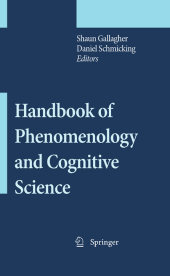 Neuerscheinungen 2014Stand: 2020-02-01 |
Schnellsuche
ISBN/Stichwort/Autor
|
Herderstraße 10
10625 Berlin
Tel.: 030 315 714 16
Fax 030 315 714 14
info@buchspektrum.de |

Shaun Gallagher, Daniel Schmicking
(Beteiligte)
Handbook of Phenomenology and Cognitive Science
Herausgegeben von Schmicking, Daniel; Gallagher, Shaun
2010. 2014. ix, 688 S. 260 mm
Verlag/Jahr: SPRINGER NETHERLANDS; SPRINGER 2014
ISBN: 9400786476 (9400786476)
Neue ISBN: 978-9400786479 (9789400786479)
Preis und Lieferzeit: Bitte klicken
The idea that phenomenology, in the European tradition, has something to offer the cognitive sciences is a recent development. Here, leading researchers address topics that lie at the intersection between phenomenological studies and the cognitive sciences.
This volume explores the essential issues involved in bringing phenomenology together with the cognitive sciences, and provides some examples of research located at the intersection of these disciplines. The topics addressed here cover a lot of ground, including questions about naturalizing phenomenology, the precise methods of phenomenology and how they can be used in the empirical cognitive sciences, specific analyses of perception, attention, emotion, imagination, embodied movement, action and agency, representation and cognition, inters- jectivity, language and metaphor. In addition there are chapters that focus on empirical experiments involving psychophysics, perception, and neuro- and psychopathologies. The idea that phenomenology, understood as a philosophical approach taken by thinkers like Husserl, Heidegger, Sartre, Merleau-Ponty, and others, can offer a positive contribution to the cognitive sciences is a relatively recent idea. Prior to the 1990s, phenomenology was employed in a critique of the first wave of cognitivist and computational approaches to the mind (see Dreyfus 1972). What some consider a second wave in cognitive science, with emphasis on connectionism and neuros- ence, opened up possibilities for phenomenological intervention in a more positive way, resulting in proposals like neurophenomenology (Varela 1996). Thus, bra- imaging technologies can turn to phenomenological insights to guide experimen- tion (see, e. g. , Jack and Roepstorff 2003; Gallagher and Zahavi 2008).
From the reviews:
"It is a much needed volume for examination of possible connections between phenomenology and cognitive science, the current vanguard of the dominant mainstream school of cognitive psychology. ... There are different topics covered and there are different perspectives presented. ... chapters have their respective merits and deserve consideration. Springer has provided to readers a broad coverage of the possible relationship between phenomenology and cognitive science." (Thomas F. Cloonan, Journal of Phenomenological Psychology, Vol. 43 (2), 2012)
Daniel Schmicking ist seit 2002 Lehrbeauftragter mit dem Schwerpunkt "Theoretische Philosophie der Neuzeit und der Gegenwart" am Philosophischen Seminar der Universität Mainz. Seit 2008 ist er Gastprofessor an der University of Central Florida.


